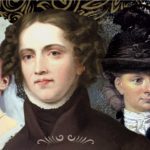
Elizabeth Gaskell’s last novel, Wives and Daughters, explored the position of women in 19th century society and the pressure on them to marry. Her book had much to say about marriage, including storylines like Mrs Gibson’s marriage of necessity, Cynthia’s secret engagement and Molly’s hoped-for love-match. Now we compare fiction with reality in this special dual talk on Unmarried Women.
Firstly, popular speaker Elizabeth Williams explores the life and options for unmarried women in Wives and Daughters and other Elizabeth Gaskell novels. How did the writer view marriage? Did she suggest other options to her readers?
Secondly, writer Charlotte Furness introduces four historical women who each challenged and defied the societal expectations of their times by making the conscious decision not to marry a man. She brings to light the life and times of Anne Lister of Shibden Hall, Elizabeth Isham of Lamport Hall, Anne Robinson of Saltram and Rosalie Chichester of Arlington Court. To what extent could these real women live the life they wanted?
Join us for an evening looking at unmarried women in fact and fiction.
PS We know that Anne Lister was, now rather famously, actually married to another woman but we are looking at women who rejected social expectations of traditional marriage.
• Elizabeth Williams taught in a variety of institutions including schools, colleges, the British Council in Finland and a mental hospital. She has been chairwoman of the Gaskell Society and a trustee of Elizabeth Gaskell’s House.
• Charlotte Furness is a writer and heritage historian, exploring women’s history and the history of the country house. She previously worked for English Heritage, Lamport Hall, Harewood House, Temple Newsam House, Renishaw Hall and more. She is author of Lady of the House and Unmarried Women of the Country Estate. You can visit her website via this link to Charlotte Furness website.
‘Elizabeth Williams conveyed her intimate knowledge of Gaskell’s life and works lightly and easily. I learnt a lot, quickly and effortlessly.’ Audience member
Wednesday 16 October, 7-8pm
Tickets £5
**Refer to your e-ticket for joining instructions and links. Please check your spam/junk mail for ticket. This talk will also be recorded and all ticketholders will receive a link to the recording via TicketSource after the event.**
An evening of love-themed poetry, spoken word and music, to celebrate love in its many forms.

Please join us to celebrate the launch of The Devil Prefers Mozart: On Music and Musicians, 1962-1993 by Anthony Burgess, edited by Paul Phillips. The event will be hosted by Matthew Robinson. The event will feature readings and discussion, and audience members will have the opportunity to ask their own questions. We will show the text during readings so that you can read along.
Registration for this online event will cost £2, redeemable against the cost of the book. You will receive the discount code and instructions for how to purchase the book in your confirmation email as well as during and after the event.
The Devil Prefers Mozart is the first comprehensive collection of Anthony Burgess’s writings about music. In this extensive compilation of essays and reviews, he covers a vast range of musical topics, from the hurdy-gurdy to Beatlemania and the Sex Pistols, with Burgess’s love of English music represented by writings on Elgar, Holst, and Delius. There are essays on Handel, Mozart, Beethoven, Berlioz and Wagner and other great composers from Monteverdi to Weill, as well as writings about Burgess’s favourite performers, including Yehudi Menuhin, Larry Adler and John Sebastian. Whether whimsical (‘Food and Music’), satirical (‘Anybody Can Conduct’) or controversial (‘Why Punk Had to End in Evil’), Burgess’s writing is consistently informative and entertaining.
The music of Debussy sparked Burgess’s musical imagination so powerfully when he was a boy in Manchester that he composed his first symphony at eighteen years of age and aspired to a career as a professional composer until his mid-thirties. Writings about his own music provides valuable information about many of Burgess’s compositions, including his Symphony in C, his works for guitar quartet, and his opera Blooms of Dublin based on Joyce’s Ulysses.
Carcanet also publishes The Ink Trade, a companion volume of literary essays.
About the speakers:
Paul Phillips is the Gretchen B. Kimball Director of Orchestral Studies and Associate Professor of Music at Stanford University. He is the author of A Clockwork Counterpoint: The Music and Literature of Anthony Burgess, published in 2010, and essays on Burgess published in six other books, including the Norton Critical Edition of A Clockwork Orange. He has led performances of many Burgess compositions in concert, including numerous premieres, and conducted the first commercial recording of Burgess’s orchestral music, released by Naxos in 2016.